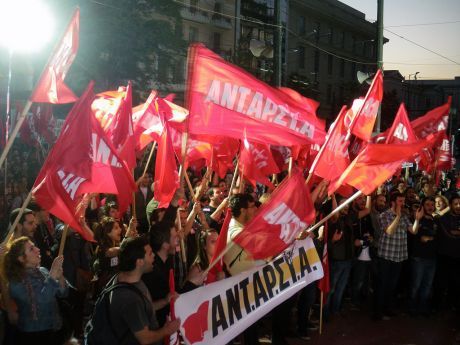Shared
You are here
Resistance follows betrayal in Greece

August 18, 2015
The glaring contradiction in Greece’s government is producing a political crisis. Left wing party Syriza was elected on an anti-austerity programme and now it is implementing the worst austerity measures yet.
To win a majority in parliament it is relying on the votes of the right wing and centre parties that supported a yes to austerity in last month’s referendum. But the yes vote was a minority. This situation isn’t sustainable. Prime minister Alexis Tsipras cannot go on governing like this. But he is between a rock and a hard place.
MPs voted last week to sign the third “memorandum of understanding” with Greece’s creditors. They confirmed support for the austerity measures they voted for last month as part of an agreement for a new loan from the European Stability Mechanism. The government hopes to receive the first instalment by Thursday of this week. It will go straight to the European Central Bank to pay for the last loan.
Every future instalment will depend on a green light from inspectors checking up on the government’s finances to make sure it is pushing ahead with austerity. In particular this is to speed up privatisations, creating a fund to oversee the selloff of everything the public sector can sell. But the mood for a fightback is there.
Usually August is a month where nothing happens in Greece. This year there was a shutdown of the railways by workers fighting privatisation. And there was a strike against sackings at one of the main private TV channels that appears to have won at least a partial victory. The fact that left wing MPs inside Syriza voted against the deal reinforces this mood.
Pressure
It’s a virtuous circle. People’s anger puts pressure on MPs to vote against the deal, and when they do it makes people more confident they can fight back. Not all the 44 rebel MPs are in the organised Left Platform, and Tsipras is manoeuvring to try and divide them.
Government officials have said there will be a vote of confidence—a way of putting pressure on rebel MPs to see how far they will go. And Tsipras has promised a special congress of Syriza. This is being used as an argument against a split by the Left Platform.
A group including 17 MPs from all sides of the vote has called for unity, and if the Left Platform walks out before the congress it could lose some waverers. To create an independent group, Left Platform members will need to get themselves in order politically. What basis would they split on?
Most are opposed to the euro but they need to decide whether that also means a break with the European Union, for example. We in SEK, the Socialist Workers Party in Greece, argue that they should break with Syriza—and follow the logic of this towards anti-capitalist left front Antarsya.
Even if Tsipras succeeds in splitting away some MPs he is expected to go for a new election. But that’s no easy way out. A new election will be confirmation of the political crisis. It will mean the government collapsing within eight months of the election as a result of going against the majority who voted no to austerity. And it will produce a shift to the left. If the Left Platform does split it could give visible form to this.
But if it compromises inside Syriza both Antarsya and the Communist Party expect to see their votes go up. And if Tsipras manoeuvres his way out of calling an election, he will run into a strike wave. There’s no way he can cut pensions, for example, without facing a strike.
The first major demonstration will be on the first Saturday of September, when the prime minister always opens the Thessalonica fair, and the unions call a protest. This year it will be Tsipras that faces the demonstration, and it will be dominated by left wing opposition to the bailout.
Panos Garganas is editor of Workers Solidarity, Socialist Worker’s sister newspaper in Greece. This is shared from Socialist Worker (UK)
Section:









